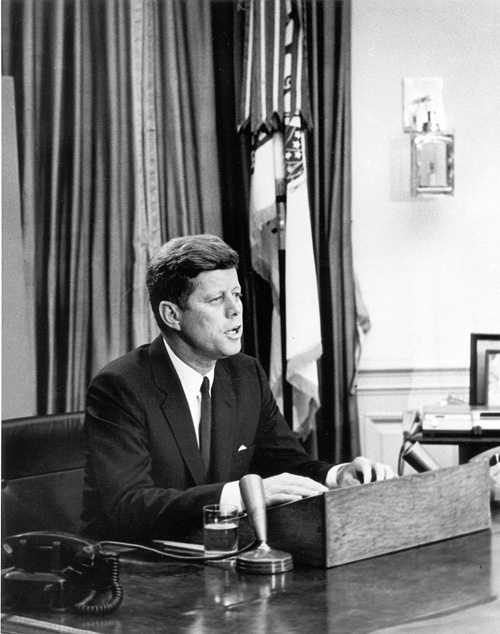
Why does the memory of John F. Kennedy exert such an enduring hold on the imaginations of so many Americans?
There are, to be sure, numerous factors that conjoin memorably in our thinking of his unfinished life: his relative youth; his visionary leadership; his notable speaking and writing ability; his manifest energy; his trademark personal style; his skill of connecting with the world through the universal, personalizing medium of television; his personification of the high tide of postwar American self-confidence and faith in the future.
All that is knitted together with a golden thread: Kennedy’s mastery of the art of becoming.
The Art of Becoming
If leadership is about service, then one of the first duties and expectations of any leader is to constantly evolve. The needs of those one serves are never static. The evaluation of those one serves is never final. If one would serve to lead, one must continually welcome change, instigate change, adapt to change.
Individual leaders who reach beyond their immediate time and place tend to be in a manifest process of evolution; we witness them becoming something new. They may, like Kennedy or Theodore Roosevelt, embark on strenuous projects of self-improvement. They seek to expand their capacities, their horizons.
Kennedy’s Unfinished Journey
Speculation abounds as to what Kennedy was becoming, what he might have become. Inevitably, such parlor games are more about the players than Kennedy.
Would he have expanded the Vietnam conflict—or averted its tragic escalation? Would he have advocated a War on Poverty along the lines enacted in Lyndon Johnson’s administration—or would he have done something altogether different?
The reality is that we cannot know. Kennedy’s ongoing evolution makes it conceivable that he might have entirely reframed the discussions and understandings of these and other major issues.
It is that loss—and the ruthless finality that violence wrought to his process of becoming—that we justly lament.
Welding Contradictions into Character
In the course of their evolution, consequential leaders can create an energy field from their evident struggles to control or contain or rearrange contradictory parts of their temperament.
Kennedy’s apparent contradictions abound. He was by turns:
—confident without bounds and chastened by ultimate humility
—highly partisan and willfully independent
—idealistic and pragmatic
—elegant and earthy
—engaged yet detached
—giving and grasping
—a devotee of history and one who eagerly sought the future
—a homme serieux and a cut-up
—a thinker and a doer
—a man of determined vigor amid debilitating health challenges
—a politician who reveled in power and sought a higher purpose
—marked by more than a tinge of ambition and proved himself by selfless service of others
—memorably charming and alternately heedless of those around him
—proudly Irish-American yet also an Anglophile
—marked by great achievements and devastating failures.
Kennedy attempted, to greater or lesser effect, to reconcile these contradictions. His perspective, in part, was as an artist, a writer. As a result, he saw things from a distance—even when he was part of the tableau. He sought to meet the standards of leaders he plucked from history as exemplars.
What’s notable is his intensity of purpose, his relentless sense of urgency.
In part, his drive was powered by his acute awareness of losing much of his youth to frailty. He had time to make up for.
So, too he was propelled by his awareness, unusual in our time, of death as a constant companion. He had no time to waste.
Kennedy’s tangible accomplishments as president were limited by his untimely death. His leadership example retains vitality through his mastery of the art of becoming.
Leadership is a Work in Progress
Not everyone would agree that Kennedy’s evolution was a salutary phenomenon.
A contemporary critic discerned a hollowness at the core of the politician’s character. He was “always making and remaking himself.” The president was “the final product of a fanatical job of self-remodeling.”
In the more than half-century since Kennedy’s death, idolaters and apologists have sought to conceal his failings.
For their part, implacable critics have sought to turn all attention to his shortcomings.
In fact, Kennedy’s leadership remains compelling, because he variously exhibited virtues and shortcomings to an exceptional degree. It is within those contradictions that we glimpse his essential humanity, unclouded by the dust stirred amid symbolic struggles of others to define his legacy.
The struggles and expression of a flawed yet unbowed character are where we can locate lessons for our own, very different circumstances.
What Are You Becoming?
What about your leadership and service journey?
Who are your exemplars? Do you have spiritual ancestors?
How are you standards evolving?
What are you becoming?
John F Kennedy | The Art of Becoming
